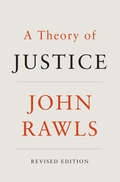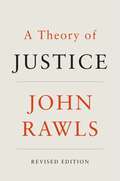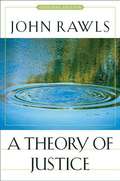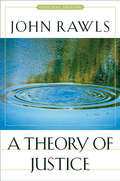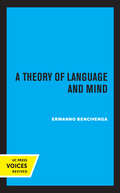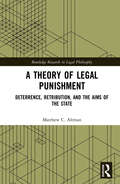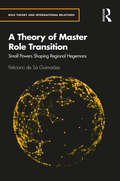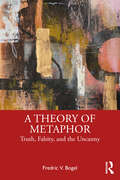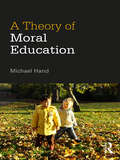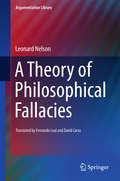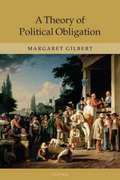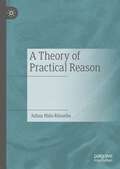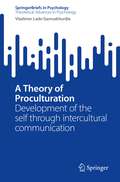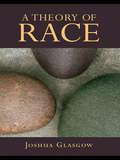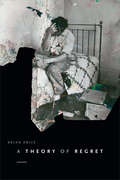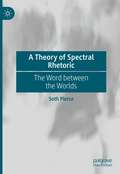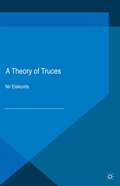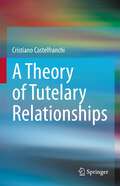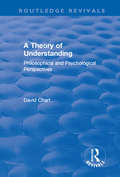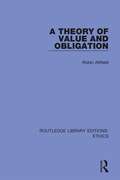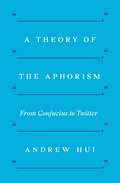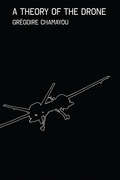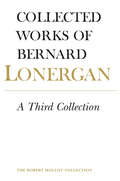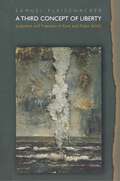- Table View
- List View
A Theory of Justice
by John RawlsRawls aims to express an essential part of the common core of the democratic tradition- justice as fairness- and to provide an alternative to utilitarianism, which had dominated the Anglo-Saxon tradition of political thought since the nineteenth century.
A Theory of Justice
by John RawlsSince it appeared in 1971, John Rawls's A Theory of Justice has become a classic. The author has now revised the original edition to clear up a number of difficulties he and others have found in the original book.
A Theory of Justice (Original Edition)
by John RawlsThough the revised edition of A Theory of Justice, published in 1999, is the definitive statement of Rawls's view, so much of the extensive literature on Rawls's theory refers to the first edition. This reissue makes the first edition once again available for scholars and serious students of Rawls's work.
A Theory of Justice: Original Edition
by John RawlsJohn Rawls aims to express an essential part of the common core of the democratic tradition—justice as fairness—and to provide an alternative to utilitarianism, which had dominated the Anglo-Saxon tradition of political thought since the nineteenth century. Rawls substitutes the ideal of the social contract as a more satisfactory account of the basic rights and liberties of citizens as free and equal persons. “Each person,” writes Rawls, “possesses an inviolability founded on justice that even the welfare of society as a whole cannot override.” Advancing the ideas of Rousseau, Kant, Emerson, and Lincoln, Rawls’s theory is as powerful today as it was when first published. Though the revised edition of A Theory of Justice, published in 1999, is the definitive statement of Rawls’s view, much of the extensive literature on his theory refers to the original. This first edition is available for scholars and serious students of Rawls’s work.
A Theory of Justice: Revised Edition
by John RawlsSince it appeared in 1971, John Rawls’s A Theory of Justice has become a classic. The author has now revised the original edition to clear up a number of difficulties he and others have found in the original book. Rawls aims to express an essential part of the common core of the democratic tradition—justice as fairness—and to provide an alternative to utilitarianism, which had dominated the Anglo-Saxon tradition of political thought since the nineteenth century. Rawls substitutes the ideal of the social contract as a more satisfactory account of the basic rights and liberties of citizens as free and equal persons. “Each person,” writes Rawls, “possesses an inviolability founded on justice that even the welfare of society as a whole cannot override.” Advancing the ideas of Rousseau, Kant, Emerson, and Lincoln, Rawls’s theory is as powerful today as it was when first published.
A Theory of Language and Mind
by Ermanno BencivengaIn his most recent book, Ermanno Bencivenga offers a stylistically and conceptually exciting investigation of the nature of language, mind, and personhood and the many ways the three connect. Bencivenga, one of the most iconoclastic voices to emerge in contemporary American philosophy, contests the basic assumptions of analytic (and also, to an extent, postmodern) approaches to these topics. His exploration leads through fascinating discussions of education, courage, pain, time and history, selfhood, subjectivity and objectivity, reality, facts, the empirical, power and transgression, silence, privacy and publicity, and play—all themes that are shown to be integral to our thinking about language. Relentessly bending the rules, Bencivenga frustrates our expectations of a "proper" theory of language. He invokes the transgressions of Nietzsche and Wittgenstein even as he appropriates the aphoristic style of Wittgenstein's Tractatus. Written in a philosophically playful and experimental mode, A Theory of Language and Mind draws the reader into a sense of continual surprise, therapeutic discomfort, and discovery. This title is part of UC Press's Voices Revived program, which commemorates University of California Press’s mission to seek out and cultivate the brightest minds and give them voice, reach, and impact. Drawing on a backlist dating to 1893, Voices Revived makes high-quality, peer-reviewed scholarship accessible once again using print-on-demand technology. This title was originally published in 1997.
A Theory of Legal Punishment: Deterrence, Retribution, and the Aims of the State (Routledge Research in Legal Philosophy)
by Matthew C. AltmanThis book argues for a mixed theory of legal punishment that treats both crime reduction and retribution as important aims of the state. A central question in the philosophy of law is why the state’s punishment of its own citizens is justified. Traditionally, two theories of punishment have dominated the field: consequentialism and retributivism. According to consequentialism, punishment is justified when it maximizes positive outcomes. According to retributivism, criminals should be punished because they deserve it. This book recognizes the strength of both positions. According to the two-tiered model, the institution of punishment and statutory penalties, as set by the legislature, are justified based on their costs and benefits, in terms of deterrence and rehabilitation. The law exists to preserve the public order. Criminal courts, by contrast, determine who is punished and how much based on what offenders deserve. The courts express the community’s collective sense of resentment at being wronged. This book supports the two-tiered model by showing that it accords with our moral intuitions, commonly held (compatibilist) theories of freedom, and assumptions about how the extent of our knowledge affects our obligations. It engages classic and contemporary work in the philosophy of law and explains the theory’s advantages over competing approaches from retributivists and other mixed theorists. The book also defends consequentialism against a longstanding objection that the social sciences give us little guidance regarding which policies to adopt. Drawing on recent criminological research, the two-tiered model can help us to address some of our most pressing social issues, including the death penalty, drug policy, and mass incarceration. This book will be of interest to philosophers, legal scholars, policymakers, and social scientists, especially criminologists, economists, and political scientists.
A Theory of Master Role Transition: Small Powers Shaping Regional Hegemons (Role Theory and International Relations)
by Feliciano de Sá GuimarãesIn this book, Feliciano de Sá Guimarães offers an original application of Role Theory. He proposes a theory of master role transitions to explain how small powers can change regional powers’ master roles without changing the regional material power distribution.Master role transition is the replacement of an active dominant master role by a dormant or inactive role located within one’s role repertoire. Guimarães argues that only a combination of four necessary conditions can produce a full master role transition: asymmetrical material interdependence, altercasting, domestic contestation and regional contestation. In each one of these conditions, a small power uses material and ideational tools to promote a master role transition within the regional power role repertoire. To test his model, Guimarães turns to five case studies in Latin America, Southern Africa and South Asia: the 2006–2007 Bolivia–Brazil gas crisis, the 2008–2009 Paraguay–Brazil Itaipú Dam crisis, the 2008–2009 Ecuador–Brazil Odebrecht crisis, the 1998 South Africa–Lesotho military intervention crisis and the 1996India–Bangladesh Ganges water crisis.A Theory of Master Role Transition is an excellent resource for those studying both theory and method in International Relations and foreign policy analysis.
A Theory of Metaphor: Truth, Falsity, and the Uncanny
by Fredric V. BogelA Theory of Metaphor: Truth, Falsity, and the Uncanny is a strikingly original analysis of metaphor. Scholarly and imaginative, this sophisticated theory builds on a simple definition: metaphors are not comparisons but statements of identity (A is B), statements simultaneously true and false.Bogel explores a broad range of literary theory and philosophy: from Aristotle to Žižek, Augustine to Wittgenstein, Richards to Ricoeur and Blumenberg. The book analyzes a wide variety of literary and non-literary texts, including popular forms such as graveyard epitaphs, sermons, cartoons (Garry Trudeau's Doonesbury), and a haunting episode of Star Trek: The Next Generation. It extends the central concept of truth and falsity to the reader's encounter with metaphor, figural interpretation of scripture, entire poems as metaphors, the aesthetics of obliquity and textual impurity, and Freudian psychoanalysis—in particular, links between metaphor and the uncanny.This rigorously and eloquently argued book will be invaluable to students of metaphor across such fields as literary criticism and theory, philosophy, linguistics, rhetoric, psychoanalysis, and media studies. Its arguments are enriched by numerous concrete examples and analyses that bring theory to life and help to reach beyond an academic audience. Bogel's ground-breaking study takes our understanding of metaphor in new and important directions.
A Theory of Moral Education
by Michael HandChildren must be taught morality. They must be taught to recognise the authority of moral standards and to understand what makes them authoritative. But there’s a problem: the content and justification of morality are matters of reasonable disagreement among reasonable people. This makes it hard to see how educators can secure children’s commitment to moral standards without indoctrinating them. In A Theory of Moral Education, Michael Hand tackles this problem head on. He sets out to show that moral education can and should be fully rational. It is true that many moral standards and justificatory theories are controversial, and educators have an obligation to teach these nondirectively, with the aim of enabling children to form their own considered views. But reasonable moral disagreement does not go all the way down: some basic moral standards are robustly justified, and these should be taught directively, with the aim of bringing children to recognise and understand their authority. This is an original and important contribution to the philosophy of moral education, which lays a new theoretical foundation for the urgent practical task of teaching right from wrong.
A Theory of Philosophical Fallacies (Argumentation Library #26)
by Leonard NelsonPresented as a Vorlesung in the German philosophical tradition, this book presents the most detailed account of Nelson's method of argument analysis, celebrated by many luminaries such as Karl Popper. It was written in 1921 in opposition to the relativistic, subjectivistic and nihilistic tendencies of Nelson's time. The book contains an exposition of a method that is a further development of Kant's transcendental dialectics, followed by an application to the critical analysis of arguments by many famous thinkers, including Bentham, Mill, Poincaré, Leibniz, Hegel, Einstein, Bergson, Rickert, Simmel, Brentano, Stammler, Jellinek, Dingler, and Meinong. The book presents a general theory of philosophical argumentation as seen from the viewpoint of the typical fallacies committed by anybody arguing philosophically, whether professional philosophers or philosophical laypeople. Although the nature of philosophy and philosophical argumentation is one of the most recurrent objects of reflection for philosophers, this book represents the first attempt at a general theory of philosophical fallacy. According to Nelson, it is in the shape of false dilemmas that errors in reasoning always emerge, and false dilemmas are always the result of the same mechanism--the unwitting replacement of one concept for another.
A Theory of Political Obligation: Membership, Commitment, and the Bonds of Society
by Margaret GilbertMargaret Gilbert offers an incisive new approach to a classic problem of political philosophy: when and why should I do what the laws of my country tell me to do? Beginning with carefully argued accounts of social groups in general and political societies in particular, the author argues that in central, standard senses of the relevant terms membership in a political society in and of itself obligates one to support that society's political institutions. The obligations in question are not moral requirements derived from general moral principles, as is often supposed, but a matter of one's participation in a special kind of commitment: joint commitment. An agreement is sufficient but not necessary to generate such a commitment. Gilbert uses the phrase 'plural subject' to refer to all of those who are jointly committed in some way. She therefore labels the theory offered in this book the plural subject theory of political obligation. The author concentrates on the exposition of this theory, carefully explaining how and in what sense joint commitments obligate. She also explores a classic theory of political obligation --- actual contract theory --- according to which one is obligated to conform to the laws of one's country because one agreed to do so. She offers a new interpretation of this theory in light of a theory of plural subject theory of agreements. She argues that actual contract theory has more merit than has been thought, though the more general plural subject theory is to be preferred. She compares and contrasts plural subject theory with identification theory, relationship theory, and the theory of fair play. She brings it to bear on some classic situations of crisis, and, in the concluding chapter, suggests a number of avenues for related empirical and moral inquiry. Clearly and compellingly written, A Theory of Political Obligation will be essential reading for political philosophers and theorists.
A Theory of Practical Reason
by Julian Nida-RümelinIn this book, German philosopher Julian Nida-Rümelin presents a theory of practical reason that is objectivist, or rather realist, as an alternative to the widespread subjectivism in the theory of rationality. This theory has pragmatic traits that can be read as a constructive counterpart to Nida-Rümelin's critique of consequentialism whilst embedding its conception of rationality in the conceptual framework of decision and game theory.
A Theory of Proculturation: Development of the self through intercultural communication (SpringerBriefs in Psychology)
by Vladimer Lado GamsakhurdiaIn each connection with new cultural contexts a new hybrid state of cultural adaptation is constructed enabling people to adjust to new conditions by creating innovative solutions for the self. This book aims to provide a brief presentation of innovative cultural psychological theory of proculturation reflecting and oriented on the understanding of semiotic and developmental dynamics of higher mental phenomena while engaging alien signs through intercultural communication. The exploration and theoretical understanding of developmental dynamics (such as self and identity construction) of people who live in immigration or multicultural, or even multi-ethnic societies, the research builds its new focus in contrasts with the acculturation theories currently present in social psychology. The theory of proculturation has been built in opposition to cross-cultural psychological theories as well as mainstream theories of acculturation research dominated by bidimensional theoretical models. Instead, this theory is constructed based on theoretical explorations which are rooted in cultural semiotics and developmental psychological paradigm on human psychology.
A Theory of Race
by Joshua GlasgowSocial commentators have long asked whether racial categories should be conserved or eliminated from our practices, discourse, institutions, and perhaps even private thoughts. In A Theory of Race, Joshua Glasgow argues that this set of choices unnecessarily presents us with too few options. Using both traditional philosophical tools and recent psychological research to investigate folk understandings of race, Glasgow argues that, as ordinarily conceived, race is an illusion. However, our pressing need to speak to and make sense of social life requires that we employ something like racial discourse. These competing pressures, Glasgow maintains, ultimately require us to stop conceptualizing race as something biological, and instead understand it as an entirely social phenomenon.
A Theory of Regret
by Brian PriceIn A Theory of Regret Brian Price contends that regret is better understood as an important political emotion than as a form of weakness. Price shows how regret allows us to see that our convictions are more often the products of our perceptual habits than the authentic signs of moral courage that we more regularly take them to be. Regret teaches us to give up our expectations of what we think should or might occur in the future, and also the idea that what we think we should do will always be the right thing to do. Understood instead as a mode of thoughtfulness, regret helps us to clarify our will in relation to the decisions we make within institutional forms of existence. Considering regret in relation to emancipatory theories of thinking, Price shows how the unconditionally transformative nature of this emotion helps us become more sensitive to contingency and allows us, in turn, to recognize the steps we can take toward changing the institutions that shape our lives.
A Theory of Spectral Rhetoric: The Word between the Worlds
by Seth PierceThis book synthesizes Jacques Derrida’s hauntology and spectrality with affect theory, in order to create a rhetorical framework analyzing the felt absences and hauntings of written and oral texts. The book opens with a history of hauntology, spectrality, and affect theory and how each of those ideas have been applied. The book then moves into discussing the unique elements of the rhetorical framework known as the rhetorrectional situation. Three case studies taken from the Christian tradition, serve to demonstrate how spectral rhetoric works. The first is fictional, C.S. Lewis ’The Great Divorce. The second is non-fiction, Tim Jennings ’The God Shaped Brain. The final one is taken from homiletics, Bishop Michael Curry’s royal wedding 2018 sermon. After the case studies conclusion offers the reader a summary and ideas future applications for spectral rhetoric.
A Theory of Truces (Palgrave Studies in Ethics and Public Policy)
by Nir EisikovitsThis book argues that understanding truces is crucial for our ability to wind down wars. We have paid too much attention to the idea of permanent peace, yet few conflicts end in this way. The book describes how truce makers think, which truces can be morally justified and provides a philosophical history of truce making in the Western tradition.
A Theory of Tutelary Relationships
by Cristiano CastelfranchiThe purpose of the book is to propose and exploit an analytical, critical, well defined theory of a very crucial human social relation that I call “Tutelarity/ Tutelage”. This will thus explain how/why such relation is so relevant at any layer of sociality: from affective relationships, to social cooperation and interactions, to politics and democracy. The approach is theoretical and strongly grounded on cognitive science and the models of human mind: beliefs, desires, expectations, emotions, etc. Written in an accessible way, it will be of interest for a large audience, specifically to researchers and scientists interested in cognitive science and the dynamics of social relationships alike.
A Theory of Understanding: Philosophical and Psychological Perspectives (Routledge Revivals)
by David ChartThis title was first published in 2000. Philosophers have been greatly concerned with the nature of explanation, but no account has been fully satisfactory within science or plausible in the wider world. The author asserts that this is due to a misplaced focus and that instead of focusing on explanation, philosophers should consider understanding. This work outlines his theory and defends it against some objections. Attempts to understand understanding can become self-referential, but the book is intended to enable readers to build a good mental model of the author's theory.
A Theory of Value and Obligation
by Robin AttfieldOriginally published in 1987 and re-issued in 2020 with a new Preface, this book presents and elaborates interrelated solutions to a number of problems in moral philosophy, from the location of intrinsic value and the nature of a worthwhile life, via the limits of obligation and the nature of justice, to the status of moral utterances. After developing a biocentric account of moral standing, the author locates worthwhile life in the development of the generic capacities of a creature, whether human or nonhuman, and presents an account of relative intrinsic value which later generates a theory of interspecific justice. This value-theory also informs a consequentialist understanding of obligation, of moral rightness and of supererogation. The understanding thus supplied is shown to cope with the problems of integrity, of justice and of the ‘Repugnant Conclusion’ in population ethics. A cognitivist account of ethical conclusions such as those so far reached is then defended against non-cognitivist and relativist objections and a far-reaching naturalist theory is defended, integrating earlier conclusions with an account of the logic of the fundamental ethical concepts. This wide-ranging volume which maps the whole area of morality is thoroughly argued with reference both to contemporary philosophical developments and to classical theories.
A Theory of the Aphorism: From Confucius to Twitter
by Andrew HuiAn engaging look at the aphorism, the shortest literary form, across time, languages, and culturesAphorisms—or philosophical short sayings—appear everywhere, from Confucius to Twitter, the Buddha to the Bible, Heraclitus to Nietzsche. Yet despite this ubiquity, the aphorism is the least studied literary form. What are its origins? How did it develop? How do religious or philosophical movements arise from the enigmatic sayings of charismatic leaders? And why do some of our most celebrated modern philosophers use aphoristic fragments to convey their deepest ideas? In A Theory of the Aphorism, Andrew Hui crisscrosses histories and cultures to answer these questions and more.With clarity and precision, Hui demonstrates how aphorisms—ranging from China, Greece, and biblical antiquity to the European Renaissance and nineteenth century—encompass sweeping and urgent programs of thought. Constructed as literary fragments, aphorisms open new lines of inquiry and horizons of interpretation. In this way, aphorisms have functioned as ancestors, allies, or antagonists to grand systems of philosophy.Encompassing literature, philology, and philosophy, the history of the book and the history of reading, A Theory of the Aphorism invites us to reflect anew on what it means to think deeply about this pithiest of literary forms.
A Theory of the Drone
by Grégoire ChamayouDrone warfare has raised profound ethical and constitutional questions both in the halls of Congress and among the U.S. public. Not since debates over nuclear warfare has American military strategy been the subject of discussion in living rooms, classrooms, and houses of worship. Yet as this groundbreaking new work shows, the full implications of drones have barely been addressed in the recent media storm.In a unique take on a subject that has grabbed headlines and is consuming billions of taxpayer dollars each year, philosopher Grégoire Chamayou applies the lens of philosophy to our understanding of how drones are changing our world. For the first time in history, a state has claimed the right to wage war across a mobile battlefield that potentially spans the globe. Remote-control flying weapons, he argues, take us well beyond even George W. Bush's justification for the war on terror.What we are seeing is a fundamental transformation of the laws of war that have defined military conflict as between combatants. As more and more drones are launched into battle, war now has the potential to transform into a realm of secretive, targeted assassinations of individuals--beyond the view and control not only of potential enemies but also of citizens of democracies themselves. Far more than a simple technology, Chamayou shows, drones are profoundly influencing what it means for a democracy to wage war. A Theory of the Drone will be essential reading for all who care about this important question.
A Third Collection: Volume 16
by John Dadosky Bernard Lonergan Robert Doran, S.J. Lonergan Research InstituteA Third Collection, prepared for the Collected Works of Bernard Lonergan by editors Robert M. Doran and John D. Dadosky, is a helpful companion to volumes four and thirteen in the series. The volume contains fifteen papers, written between 1974 and 1982, and includes some of his most important shorter writings such as "Prolegomena to the Study of the Emerging Religious Consciousness of Our Time" and "Natural Right and Historical Mindedness." The relevant archival entries are specified, so that readers can consult them. The papers in this volume rehearse in a new key the themes of a lifetime. Without in any way going back on the major emphases of Lonergan's early work–cognitional theory and then the exploration of a fourth, existential level of consciousness– they are focused more on love and on the movement from above downwards in consciousness. Community is emphasized as the context and the fruit of the emergence of authentic subjects.
A Third Concept of Liberty: Judgment and Freedom in Kant and Adam Smith
by Samuel FleischackerTaking the title of his book from Isaiah Berlin's famous essay distinguishing a negative concept of liberty connoting lack of interference by others from a positive concept involving participation in the political realm, Samuel Fleischacker explores a third definition of liberty that lies between the first two. In Fleischacker's view, Kant and Adam Smith think of liberty as a matter of acting on our capacity for judgment, thereby differing both from those who tie it to the satisfaction of our desires and those who translate it as action in accordance with reason or "will." Integrating the thought of Kant and Smith, and developing his own stand through readings of the Critique of Judgment and The Wealth of Nations, Fleischacker shows how different acting on one's best judgment is from acting on one's desires--how, in particular, good judgment, as opposed to mere desire, can flourish only in favorable social and political conditions. At the same time, exercising judgment is something every individual must do for him- or herself, hence not something that philosophers and politicians who reason better than the rest of us can do in our stead. For this reason advocates of a liberty based on judgment are likely to be more concerned than are libertarians to make sure that government provides people with conditions for the use of their liberty--for example, excellent standards of education, health care, and unemployment insurance--while at the same time promoting a less paternalistic view of government than most of the movements associated for the past thirty years with the political left.
